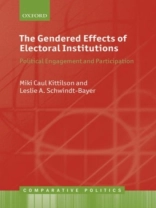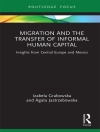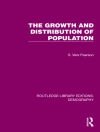In most countries around the world, women continue to lag behind men in an array of political orientations and activities. Understanding why this is the case and why some countries have been more successful than others at moderating gender gaps in political involvement is imperative for producing stronger and more representative democracies. Cultural, socioeconomic, and political factors explain some of the gender gaps in political involvement, but not all of them. In this book, the authors argue that electoral institutions attenuate gender gaps in mass political engagement and participation by drawing women, an ‘undertapped’ constituency, into the democratic process. Using cross-national and country-specific analyses, the authors show that electoralinstitutions play a complementary and significant role in reducing gender gaps in political involvement. The cross-national analyses draw on comparative survey data from a wide range and large number of countries. The case studies draw out the processes underlying changes in political attitudes and behaviors with evidence from four country studies: New Zealand, Russia, France, and Uruguay. All four countries have altered their electoral institutions, either through large-scale reform of theelectoral system itself or adopting gender quotas, allowing the authors to examine patterns of political involvement pre- and post-reform. The book finds that inclusive electoral systems that produce more proportional electoral outcomes have larger effects on women’s political engagement andparticipation than on men’s. Gender quotas also mediate women’s engagement and participation, but to a lesser degree. On the whole, the book concludes that electoral rules designed to promote social inclusion in parliament are critical for promoting social group inclusion among the electorate. Comparative Politics is a series for students, teachers, and researchers of political science that deals with contemporary government and politics. Global in scope, books in the series are characterised by a stress on comparative analysis and strong methodological rigour. The series is published in association with the European Consortium for Political Research. For more information visit: www.ecprnet.eu. The Comparative Politics Series is edited by Professor David M. Farrell, School of Politics and International Relations, University College Dublin, Kenneth Carty, Professor of Political Science, University of British Columbia, and Professor Dirk Berg-Schlosser, Institute of Political Science, Philipps University, Marburg.
Miki Caul Kittilson & Leslie A. Schwindt-Bayer
Gendered Effects of Electoral Institutions [PDF ebook]
Political Engagement and Participation
Gendered Effects of Electoral Institutions [PDF ebook]
Political Engagement and Participation
Acquista questo ebook e ricevine 1 in più GRATIS!
Lingua Inglese ● Formato PDF ● ISBN 9780191612039 ● Casa editrice OUP Oxford ● Pubblicato 2012 ● Scaricabile 6 volte ● Moneta EUR ● ID 2572121 ● Protezione dalla copia Adobe DRM
Richiede un lettore di ebook compatibile con DRM












